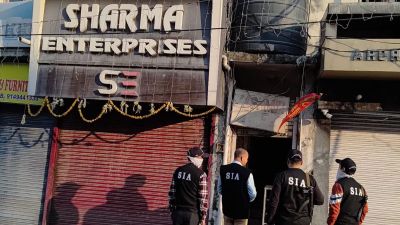Centre assures to lower floor price for Basmati export by $850/tonne
Farmers and exporters will be benefitted as Piyush Goyal assured to bring down MEP from $1,200 per metric tonne to $800 per metric tonne.
 Agricultural experts had warned that the Centre's export restrictions could negatively impact farmers, especially those who expanded Basmati cultivation this year in states like Punjab due to flooding. (Express file photo of Basmati paddy by Jasbir Malhi)
Agricultural experts had warned that the Centre's export restrictions could negatively impact farmers, especially those who expanded Basmati cultivation this year in states like Punjab due to flooding. (Express file photo of Basmati paddy by Jasbir Malhi) After a month-long struggle by Basmati rice exporters against the Centre’s imposition of a high minimum export price (MEP) on Basmati rice, Union Minister for Consumer Affairs, Food, and Public Distribution, Piyush Goyal, provided significant relief by assuring to recommend a lower MEP of $850 per metric tonne. The earlier MEP was set at $1,200 per metric tonne, adversely affecting India’s rice exports and the Basmati growers.
As exporters returned empty-handed from the two recently held international food fairs due to the high MEP, buyers turned to Pakistan.
The minister stressed that exporters should ensure that farmers receive higher prices, and exporters aim for high-value exports to boost foreign exchange for the country’s economy and compete internationally to bring prosperity to India through rice exports.
The recent Basmati rice export data from April to July revealed that approximately 71.40 per cent of Basmati rice exports fell within the price bracket of $700-1,200 per metric tonne.
“In a virtual meeting with exporters, Minister Piyush Goyal asked for their viewpoints on the MEP for Basmati rice. After considering the input from the top exporters of the country, the Minister assured them of recommending to lower the MEP,” stated Vijay Setia, the former president of All India Rice Exporters Association, adding that during the meeting, the minister reviewed the representations submitted by exporters and decided to recommend the revised MEP based on collective viewpoints.
Setia further said the minister explained that central teams, after visiting Haryana, Punjab, and Uttar Pradesh, provided feedback on the Basmati industry after implementing the new MEP. The government considered this feedback before deciding to address the issue of higher MEP.
“In the meeting, I highlighted how our exporters returned empty-handed without getting a single export order despite Indian Basmati’s huge demand in several countries during the two international food fairs. One was held in Istanbul, Turkey, from September 6 to 9, and the other in Iraq from September 19 to 21. But because of high MEP, Indian rice exporters faced difficulties as international buyers turned to Pakistan,” said Setia.
“Exporters emphasised the significance of Basmati 1509 variety, which accounts for 70 per cent of exports. Setting its MEP at $1,200 per metric tonne would hinder international orders, as evidenced by recent international food fairs,” said Ashok Sethi, director of the Punjab Rice Millers Export Association.
Exporters had previously submitted a representation to the government, Sethi said.
The issue is exacerbated by the fact that only 2-3 per cent of the total Basmati rice grown in India is consumed domestically, with the majority being produced for export by traders and exporters.
The enhanced MEP has already caused the prices of the Pusa 1509 variety to drop, potentially harming farmers in Basmati-growing states. Additionally, it might have led to a situation where farmers cannot sell their produce because exporters would not have purchased from farmers when they could not execute export orders due to high MEP.
Agricultural experts have warned that the Centre’s export restrictions could negatively impact farmers, especially those who expanded Basmati cultivation this year in states like Punjab due to flooding. Punjab has seen an increase in Basmati cultivation area this year, with around 41 per cent dedicated to short varieties that typically fetch $700 to $1,000 per metric tonne in the international market.
Indian Basmati rice exports hold substantial economic importance, with 4.5 million tonnes exported last year, valued at approximately Rs 38,000 crore.







